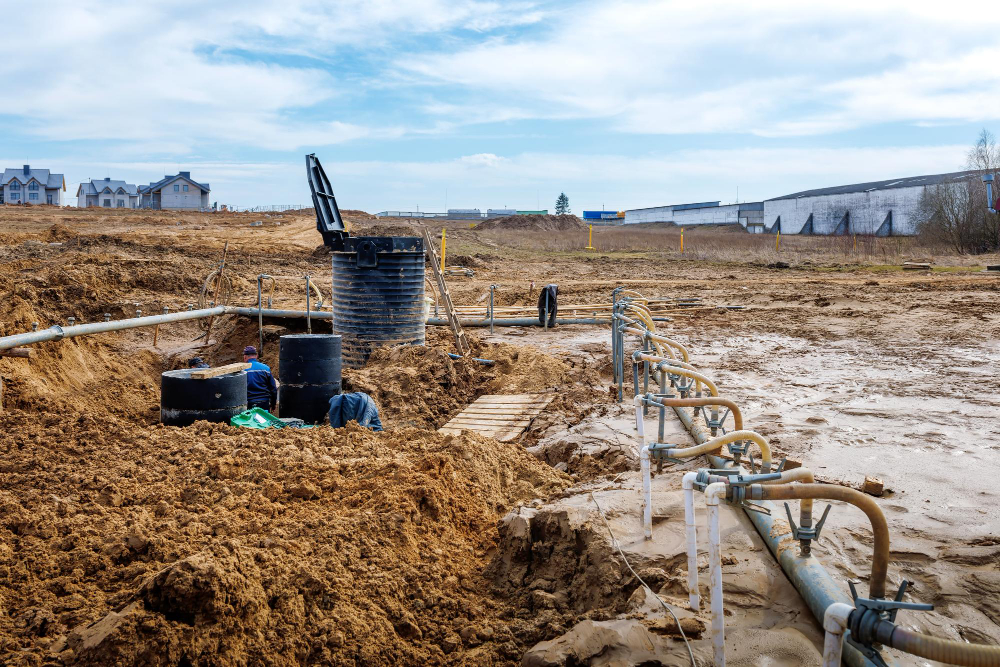Construction sites teem with activity, each step carefully taken to bring architectural visions to life. Amidst this, one often overlooked yet indispensable aspect is water management. Picture this: a bustling excavation site, but beneath the surface lies a potential threat – water. Herein lies the significance of high-quality steel dewatering pipes. These unassuming conduits play a pivotal role in maintaining dry, stable conditions safeguarding against soil instability and flooding risks.
Why Opt For Dewatering?
Dewatering is crucial for ensuring dry, stable conditions in excavation sites, enhancing soil stability, and safeguarding workers. Without effective collection and disposal of surface and sub-surface waters, numerous risks could compromise construction quality and the longevity of structures. The potential damages from inadequate water management include:
- Soil condition variations impact building integrity.
- Surface flooding risks.
- Erosion and related issues due to improper water discharge locations.
- Damp conditions foster termite infestation.
- Flooding causes damage to neighboring properties.
Incorporating steel dewatering pipes into the site preparation process is essential. These pipes play a pivotal role in efficiently removing groundwater and directing surface water away from the site, preventing accumulation. Builders, designers, and construction specialists must prioritize professional site preparation to mitigate these risks. Properly implemented dewatering strategies ensure the longevity and safety of construction projects.

Evaluating Dewatering Needs
When selecting a dewatering method, integrate insights from various analyses, including geotechnical, groundwater studies, and risk assessments relevant to your construction project. Additionally, heed advice from local authorities if applicable. Professional engineering services often become indispensable for addressing soil stabilization and groundwater control effectively.
Dewatering Process Overview – Implementing Dewatering Pipes
The standard dewatering approach entails water collection, pumping, silt filtration/removal, and finally, water discharge. Implementing dewatering pipes within this framework is crucial for managing and directing water flow away from the construction site. It ensures efficiency and safety throughout the project’s lifecycle.
Efficiency Of Open Sump Pumping
Open sump pumping stands out for its simplicity, cost-effectiveness, and broad applicability across various scenarios. This method involves creating a sump, a designated area or a pit. It is typically positioned deeper than the basement floor to gather water for removal. The integration of drains and sumps around the foundation pit facilitates groundwater collection and redirection into the sump, from where it is actively pumped out, either manually or through mechanical means.
Sump pumping is versatile, proving effective in diverse soil and rock types, from well-graded coarse soils to hard, fissured rock. However, caution is advised in specific conditions. The method may pose a risk of excavation side collapse under high groundwater flow or steep slope conditions. Furthermore, fine-grained soils, such as silts and fine sands, could trigger instability, leading to ground movement and potential settlement issues.
Advantages Of WellPoint Systems
The well-point system is celebrated for its straightforward installation, cost-efficiency, and adaptability, catering to a wide range of soil and hydrological environments. This technique involves drilling wells around the construction site and placing pumps within these wells to facilitate water removal.
Characterized by a network of small-diameter wells connected to a suction pump via a header pipe, the system efficiently extracts groundwater through a vacuum. Each well point is fitted with a perforated pipe featuring a ball valve, which not only regulates water flow but also prevents mud ingress. Capable of lowering groundwater levels by up to six meters, this method is particularly suited for constructions with deep basements and is most effective in sandy soils and gravelly sands.
Both sump pumping and well point systems illustrate the critical role of highly reliable steel dewatering pipes in managing and mitigating water-related challenges in construction sites, highlighting their importance in ensuring the stability and safety of construction projects.
Deep Well Dewatering – A Solution For Extensive Excavations
For substantial excavations where significant groundwater removal is necessary, constructing deep wells becomes a viable method. This approach is apt for soils or rocks with moderate to high permeability, such as sands and gravels. The deep well dewatering system can effectively remove water from depths up to 24 meters. Factors such as the pump capacity, along with the depth, number, and spacing of the wells, are tailored to meet specific site conditions, ensuring optimal groundwater management.
Eductor System – Tackling Low Permeability Challenges
When dealing with low permeability soils, such as very silty sands, silts, or clays, the eductor (or ejector) system presents a specialized solution. This method is particularly beneficial for stabilizing excavation side slopes and the surrounding soil. Unlike the wellpoint system, the eductor technique employs high-pressure water in its operation. High-pressure pumps at ground level propel water to the ejector nozzles and venturi at the well base. This process generates a vacuum, effectively drawing groundwater into the system.
Both the deep well and eductor systems underscore the importance of using dewatering pipes in efficiently managing and removing groundwater from construction sites. These methodologies highlight the adaptability of dewatering strategies to a variety of soil types and conditions, ensuring the structural integrity and safety of the excavation sites.
Efficient Dewatering Solutions With Bigfoot Expertise
Discover the ideal dewatering solution for your project with Bigfoot Pipe & Piling. Our premium steel dewatering pipes ensure efficient water management and site safety across a range of conditions. Whether tackling deep excavations or low permeability soils, our expertise and high-quality steel pipes stand ready to support your needs. Contact us today to navigate your dewatering challenges with confidence and precision.
